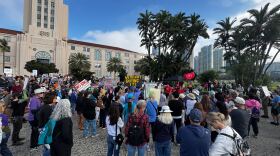The packed legislative agenda of 2009 left little room after health care, climate change and the financial overhaul to tackle immigration issues.
The last time President Obama even broached the topic of illegal immigrants before Congress was during his September speech on health care, and frankly, things didn't go so well. That was the night South Carolina Republican Joe Wilson made headlines for yelling "You lie!" at the president.
Since then, little about the topic has come out of the Senate or the House. Still, immigration has not been forgotten, and it could make an appearance in 2010.
Members of the Congressional Hispanic Caucus, vowing to put the issue front and center, have come up with their own proposal for what they call comprehensive immigration reform.
"Just because we have been patient doesn't mean we could wait forever," Rep. Luis Gutierrez (D-IL) said at a recent news conference while surrounded by Latino children wearing T-shirts that read "future voter."
He and the caucus introduced a bill that would put undocumented workers on a path to citizenship -- if they pay a $500 fine, learn English and undergo a criminal background check. The bill would also provide more training for border guards and seek better conditions at immigration detention centers.
But after a conservative backlash sent the last major immigration overhaul effort down in flames in 2007, Gutierrez says, he knows what he's up against.
"Opponents of immigration reform will use it as a wedge issue and will blame everything from unemployment to rising health care costs on immigrants," he says. "Of course, why stop at jobs and health care? Global warming? Rough stock market? Bad traffic? Lousy weather? Too many immigrants!"
But what Gutierrez calls the blame game, opponents are calling the new economic reality. Republican Rep. Steve King of Iowa is already digging in his heels.
"I think the change in the dynamics in this immigration debate is that now instead of a 4.6 percent unemployment rate, it's a 10 percent unemployment now, more than twice as much unemployment," King says. "It's clear there are at least 8 million jobs today [that] are held by people here illegally. Those are jobs that Americans can and will do."
King and other Republicans say they have several core positions: They oppose what they call amnesty; they support a locked-down border; and they want employers to verify that everyone they hire is a U.S. citizen.
But Democrats say they have reasons to be optimistic, because the atmosphere has changed since 2007. First, high unemployment has slowed the flow of illegal immigrants. Homeland Security officials say security is better than it was back then, with the addition of thousands more border patrol officers and hundreds of miles of new border fencing. Still, the Obama administration isn't planning to make a move until Congress is ready. And Democrats may be more concerned about the midterm elections.
"You may see some Democratic House members just, you know, looking at bridges thinking of jumping off," says Charlie Cook of the Cook Political Report newsletter.
Cook says in the House alone, there are upwards of 60 Democrats in competitive districts. They have already had to take politically tough votes on climate change, health care and the economic stimulus package. But the partisan battling has left both parties damaged.
"Republicans have to be careful because they come across as anti-Hispanic and immigrant bashing, and Democrats are looking bad because it looks like they are trying to shove too much down the throats of people who are only interested in job creation and getting the economy turned around," Cook explains.
With the battle over health care still churning, action on immigration is uncertain at best. In the Senate, Democrat Charles Schumer of New York is drafting legislation with the help of South Carolina Republican Lindsey Graham. Lawmakers have discouraged smaller immigration bills from moving separately to preserve some political energy for a comprehensive measure they hope to move early next year.
Copyright 2022 NPR. To see more, visit https://www.npr.org. 9(MDAzMjM2NDYzMDEyMzc1Njk5NjAxNzY3OQ001))







